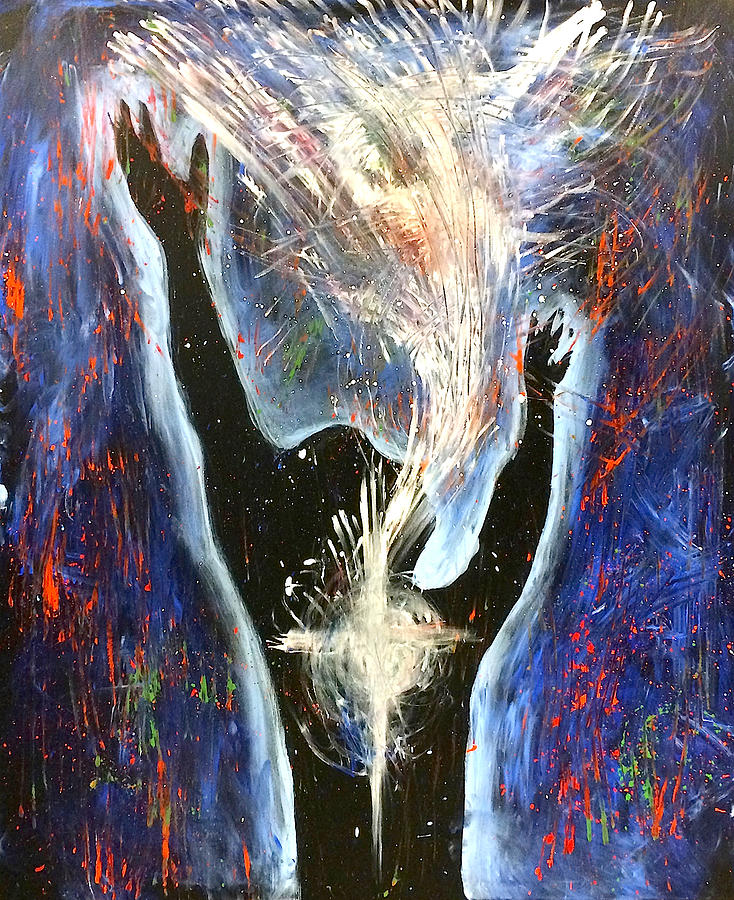
William Blake – The Angel Appearing to Zacharias (1799 -1800)
Sometimes you think you’ve got it all under control, the necessary preparations have been made, the last minute arrangements set up, and you’ve just celebrated with nearly 800 people the Nativity story and the symbolism of a red beribboned orange, pierced with a foil held candle, four cocktail sticks and various fruits and sweets (a Christingle), when someone leaves you a voicemail saying that the readings for this evening’s most important service, to which many will come for what might be their only visit to church in a year are incorrectly printed in the carefully prepared service sheet, not only incorrectly printed, but basically incorrect. Now what would you do?
Based on 2 Samuel 7:1-5, 8-11, 16 and Luke 1:67-79
Actual readings heard Isaiah 52:7-10 and John 1:1-14
May I speak and may you hear through the grace of our Lord; Father, Son and Holy Spirit. Amen
It’s wonderful to see you all here tonight, on this most important of nights; this holy night; this night when we celebrate once more the coming of God in the person of his son, Jesus Christ to earth.
However, they say that you should be prepared for anything and at about 8 o’clock this evening, it was pointed out to me that the readings that are printed in your service sheet are actually the ones for Christmas Eve – Morning Eucharist. An easy mistake to make I keep trying to tell myself, as we start this service on Christmas Eve, but we end it on Christmas Morning. I suspect when I was preparing the Worship rota in October, this minor, but important fact escaped me – I should have turned the page in the Lectionary – and so when I came to prepare my talk earlier for this evening it was the these ones that I’d used on which to base it
But I couldn’t let you not hear those beautiful readings from Isaiah and John, otherwise for some it would just not be Christmas, and I wouldn’t have got to read one of my favourite gospel passages from the bible – ‘the world became flesh and dwelt among us, and we have seen his glory’ At least it also mentions John the Baptist…
It also wouldn’t be right to make you listen to both of the other readings as well, but please do glance through them so that you at least get an idea of where I’m coming from – the first one a message from God through the prophet Nathan for King David and his kingship, and the second a song of thanksgiving, formally know as the Benedictus, and sung by Zechariah, the father of John the Baptist which prophecies about the coming saviour and the part that John will play in that.
The fact is nothing ever really happens without some preparation and for weeks (or months even) we have been preparing our workplaces, schools and homes to reflect this celebration. Or have we? Nowadays, we have to look hard amongst all the trivial fripperies, the giant inflatable Santas, the cheese advent calendars and unicorn reindeer to catch a glimpse of the real story of God coming among us.
But he is there, and your being here tonight is a sign that despite all the tinsel and the glitter, the message he came to fulfil still resonates at the deepest level with our needs as human beings.
The preparations for Jesus coming among us, probably started the moment that Adam and Eve stepped out of the Garden of Eden. God wanted us back, to heal the relationship that had broken down, to restore his trust in us.
Come forward several eons and we find ourselves in the presence of Nathan, a prophet in the time of King David, now only one thousand years before the birth of Jesus. Now at first there doesn’t seem to be any mention of a saviour, but again God is working on his preparations and it includes building a house – not a physical house – although the temple would be established by David’s son Solomon – but a dynastic house
To David, God has promised to ‘make for you a great name’. David, the unlikely king, a murderer, an adulterer, a drunken carouser – sounds a bit like he’d have fitted into the cast of Eastenders Christmas special, and yet a mighty warrior, a loving father and a great king. Originally a shepherd, one of the least amongst his society, yet an appropriate choice to be part of the lineage of Jesus.
Yet this was to be no ordinary royal dynasty – and if we want to be picky – the genealogical proof that both Luke and Matthew give us at the beginning of their gospels, that Jesus, in his humanity, was a direct descendant of Abraham and David through to Joseph, Jesus’ legally adoptive father and by birth, through Mary, is actually a messianic rather than a physical bloodline.
Come forward to another prophet, Isaiah, whose prophecy, ‘Unto us a Son is born, unto us a son is given….’ was a little premature – some seven hundred years premature to be exact, but it was further evidence of God’s preparations, before there began a silence…. A long silence… a very, very long silence…
Even at the next stage of preparations that silence was to continue as we now need to imagine we are in the temple, carrying out our priestly duties, we are called Zechariah and we have been drawn by lot to enter the sanctuary to offer incense. Zechariah probably wasn’t prepared for the sight of the angel that appeared to him, far less the news that his wife was about to embark on a geriatric pregnancy, hence why his incredulous questions rendered him unable to speak for the next nine or so months!
When he does regain his voice he uses it to confirm the child’s name and to break out into what we now call the Benedictus, his song of thanksgiving to God. It is this child that we hear about in his prophetic words, the child that will grow into the man John the Baptist, who will make the final preparations to announce Jesus’ ministry and the fulfilment of God’s promise.
And you, child, will be called the prophet of the Most High;
for you will go before the Lord to prepare his ways
Luke 2:76
But we’ve jumped too far ahead, because tonight we have come prepared for the Christ-child’s birth, in a stable, in the night, as a helpless babe. We’ve also prepared for it during the season of Advent, where each week we’ve watched and waited and thought about the reasons for his coming. Reasons, as I said, that we all instinctively know make the most sense for our lives but seem so difficult to achieve both on a personal and global scale.
The reason that he came to bring joy. A joy that was shared in the songs of Zechariah, of Mary and the angels; a joy that is heard in words and the music of the carols and songs that we sing tonight.` The angels that bent near to the earth, to bring glad tidings of goodwill from God, tiding of joy and of reconciliation. A joy that can be shared among us, in friendship and fellowship to all, not just tonight but every day
The reason that he came to bring peace. An outward peace in a world where men and women need to hush the noise of strife and warfare and look for ways of working together for the common good; and an inner peace, through the message that John will share, that ‘the dawn from on high will break upon us to give light to those who sit in darkness and in the shadow of death, to guide our feet into the way of peace’.
The reason that he came to bring love. A love that is all encompassing, limitless and freely given. Which bears all things, believes all things, hopes all things, endures all things, as Paul tells us in his letter to the Corinthians. A love that brings its own peace from knowing that whatever situation we find ourselves in, whatever we might have done, there is forgiveness available to us, and because of that forgiveness we can be in a loving relationship with God again, and through our relationship with Jesus we can love one another better
Finally, the reason that he came to bring hope; the realization of the Messianic hopes of the Jewish nation as they impatiently borne the yoke of the Romans, and continually sighed for the time when someone from the House of David would be their deliverer and to whom Zechariah was pointing in his prophecy. That same hope that is offered to all of us, regardless of age, gender, sexuality or ability. A hope that is everlasting, because of what Jesus would go on to do through his death and resurrection in order to bring us back to him at the end of time.
Zechariah wasn’t initially prepared to trust what God was going to do through him, and too often we can be so distracted by the world around us that we find it difficult to just accept what God might be saying to us, how he calls us into a relationship that demands nothing of us but to simply be prepared to open ourselves up to the possibility that his joy, his peace, his love and his hope are all that we really need.
So tonight, be open to hear his invitation to come and be prepared to receive him into your heart. Tonight, be open to share with others the things that you discover about Christ and yourself and be prepared to be that herald of good tidings. Tonight, be open to having your life changed by the child in the manger and be prepared to be transformed. Tonight be prepared for anything and everything.
Amen

O Holy Night – starry skies over Japan














